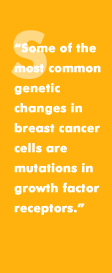 Tackling
Breast Cancer Lumped together, all of these proteins are called transcription factors. The word "transcription" describes the process in which these proteins translate a message to specific genes within a cell that tell the cell what to do - including whether to grow or die. "A lot has been learned about how these growth factors elicit changes in cell behavior. We know that genes get switched on and off. But we don't have a clear understanding of which genes are affected and how they get switched on and off," said Wisdom, an associate professor of hematology/oncology. "Some of the most common genetic changes in breast cancer cells are mutations in growth factor receptors." A quiet, unassuming man, Wisdom was trained as an oncologist but turned all of his attention toward basic cancer research after completing fellow-ships at UC San Francisco and UCLA. He loves to dig down deep to understand why certain events occur in cancer. He compares being a good basic scientist to being a good mechanic. "I just don't find it pleasing to approach a problem hoping we will find something by accident. It's like trying to fix a broken car by just banging on it. It just doesn't work," he said "Cancer is caused by genetic damage. This damage causes specific things to go wrong. It's not random. If we want to change this, we have to understand what went wrong and how to fix it." Wisdom, who has funding from the National Cancer Institute, came to UC Davis from Vanderbilt University. His research is focused on studying a group of nuclear proteins called AP-1. To test how these proteins work, researchers in Wisdom's lab removed a particular type of AP-1 protein, called c-jun, from cancer cells. They were aiming to determine whether or not a growth factor and ras proteins relied on c-jun to tell the cancer cell to divide. Ras proteins act as relays between cell surface growth factors and the transcription factors in the nucleus. It turns out c-jun plays a role in cancer growth
Home |
Table of Contents |
To our Readers |
Building on Basics UC Davis Health System | © 2000, 2001, 2002 UC Regents. All rights reserved. |
 |
